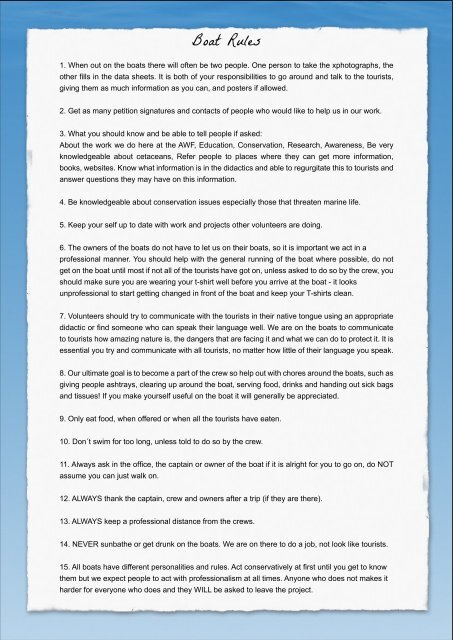Download our induction pack here - Atlantic Whale Foundation
Download our induction pack here - Atlantic Whale Foundation
Download our induction pack here - Atlantic Whale Foundation
You also want an ePaper? Increase the reach of your titles
YUMPU automatically turns print PDFs into web optimized ePapers that Google loves.
Boat Rules<br />
1. When out on the boats t<strong>here</strong> will often be two people. One person to take the xphotographs, the<br />
other fills in the data sheets. It is both of y<strong>our</strong> responsibilities to go around and talk to the t<strong>our</strong>ists,<br />
giving them as much information as you can, and posters if allowed.<br />
2. Get as many petition signatures and contacts of people who would like to help us in <strong>our</strong> work.<br />
3. What you should know and be able to tell people if asked:<br />
About the work we do <strong>here</strong> at the AWF, Education, Conservation, Research, Awareness, Be very<br />
knowledgeable about cetaceans, Refer people to places w<strong>here</strong> they can get more information,<br />
books, websites. Know what information is in the didactics and able to regurgitate this to t<strong>our</strong>ists and<br />
answer questions they may have on this information.<br />
4. Be knowledgeable about conservation issues especially those that threaten marine life.<br />
5. Keep y<strong>our</strong> self up to date with work and projects other volunteers are doing.<br />
6. The owners of the boats do not have to let us on their boats, so it is important we act in a<br />
professional manner. You should help with the general running of the boat w<strong>here</strong> possible, do not<br />
get on the boat until most if not all of the t<strong>our</strong>ists have got on, unless asked to do so by the crew, you<br />
should make sure you are wearing y<strong>our</strong> t-shirt well before you arrive at the boat - it looks<br />
unprofessional to start getting changed in front of the boat and keep y<strong>our</strong> T-shirts clean.<br />
7. Volunteers should try to communicate with the t<strong>our</strong>ists in their native tongue using an appropriate<br />
didactic or find someone who can speak their language well. We are on the boats to communicate<br />
to t<strong>our</strong>ists how amazing nature is, the dangers that are facing it and what we can do to protect it. It is<br />
essential you try and communicate with all t<strong>our</strong>ists, no matter how little of their language you speak.<br />
8. Our ultimate goal is to become a part of the crew so help out with chores around the boats, such as<br />
giving people ashtrays, clearing up around the boat, serving food, drinks and handing out sick bags<br />
and tissues! If you make y<strong>our</strong>self useful on the boat it will generally be appreciated.<br />
9. Only eat food, when offered or when all the t<strong>our</strong>ists have eaten.<br />
10. Don´t swim for too long, unless told to do so by the crew.<br />
11. Always ask in the office, the captain or owner of the boat if it is alright for you to go on, do NOT<br />
assume you can just walk on.<br />
12. ALWAYS thank the captain, crew and owners after a trip (if they are t<strong>here</strong>).<br />
13. ALWAYS keep a professional distance from the crews.<br />
14. NEVER sunbathe or get drunk on the boats. We are on t<strong>here</strong> to do a job, not look like t<strong>our</strong>ists.<br />
15. All boats have different personalities and rules. Act conservatively at first until you get to know<br />
them but we expect people to act with professionalism at all times. Anyone who does not makes it<br />
harder for everyone who does and they WILL be asked to leave the project.


